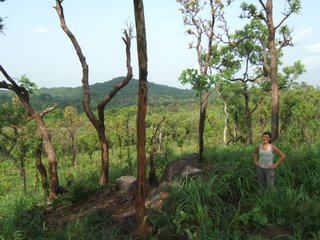Alex becomes a Republican and her listserv readership miraculously descends to “0” (5/29/06)

First off I want to apologize for my last email—editing, I realize, is a good thing, like iced tea on a hot summer day, like a sentence with only two clauses. I know you're tempted to minimize that outlook screen with the cumbersome email from the increasingly unpopular friend/niece/ex-girlfriend/fpreferred electrolocist, and turn to more product pursuits like beating your score at Snood, but bear with me. I will not disappoint.
I write you from Conakry where I have been sent on a top secret mission to dance the dundunbah for a visiting Washington peace corps official. When I got the invitation via radio, I was quite sure they were looking for another Desmond-Tutu-esque speech, and my employment at the state department would soon follow. Such is my disappointment, but can you imagine what it must be like for the official? Thirteen hours in a plane to Africa to watch WHITE women dance the Dundunbah? He will surely sever ties with Guinea.
This month, I have accepted neither desiring nor being capable of being a Guinean villager. While it is unfair that I am so unaccustomed to hardship that I reject it, I can neither feel guilty nor superior for this being the nature of things--i must accept it. Yes, its snobby and privileged, but damn it, I am too smart to spend two hours a day knocking termite mounds off the wall, as I delude myself that I am stimulating my brain by listening to the BBC, which offers to following degree of brain food: "The UN Security Commission decided today……at least 50 dead and many wounded although…the latest reports of bird flu in Africa indicate that…"
I thought it angrily at the end of last month as hay dust fell in my mouth from the very heavy bail I carried on my head to someone else's field, as wide eyed villagers gawked: "this may be authentic, I may want to be authentic, but screw it, i could go for a really inauthentic pedicure about now."
At the same time, and somewhat hypocritically, one of the American cultural traits I am most determined to communicate is our comparative dislike of privilege. Take chairs and pumps: As a "patrony" white person, I get ceremoniously shuffled from chair to chair during house calls, irrespective of whether the repetitive squatting exercise is far more of a pain in the a@# (bad pun) than remaining on the initial stool, a stool that is inevitably a full 6 inches lower than the mini chair I now occupy, after having dislocated half the family, several goats, a few chickens, the occasional cow, and a village elder. Earnestly desiring to avoid special treatment, I firmly insist on the crappier chair, which seems to tickle my groupement. I pat myself on the back at this sensibilization on the justice of equality (but who is self important).
Conversely, when it comes to the pump, I guiltily assert my colonial privilege--I glance at the long "line"--line being a euphemism for bickering swarm of barefoot women with 5-8 plastic liter containers, three wash basins, and notably gi-normous biceps--and I think, "sit here for two hours while women grab my breasts, ask me how many children I have, why I have no husband, and tell me its cuz I can't cook, or make like Pizarro and cut in line?" I usually cut, guiltily balancing my bedon next to the water spout and pump furiously amid the awed gasps (seeing white women working is still quite a coup), while I berate myself for being so hegemonic. But damn it, I am American and while part of "the American Way" (at least in theory, and at least compared to Guinea) is anti-privilege and pro-equality, my American standard of living makes me anti-waiting in lines for two hours each day for something that should come out of a faucet…
Another uncomfortable realm of privilege is stuff I own—until present, I have felt guilty about having a Peace Corps multi-speed bike, that can get a she-man like myself up hills that way stronger Guineans must dismount to tackle—but I'm as "unresponsible" for being lucky enough to have a Bike as Mamadi--who asks me for one almost daily--is for not being able to have one. Its not always easy, though. One day I was going to the field with a real bad open blister. Warned by the Peace Corps to steer clear of becoming a village medicine dispenser, I wondered if I should wear the sorely-needed but frankly opulent bandaid. "What is the point of having first world medical supplies if you're not going to use them," I said, thinking of a U.S. friend (we'll call him Shmarvin) who's "Beemer" is so nice he refuses to drive it out after 7. I wore it, and hauling well water all morning, I needed it. But sure enough, a few days later, Mamadi, who has helped me pummel cow dung with a bat for my pepiniere for several hours, holds out his calloused hand and points to a sizable open cut. Then he points to my bandaid, asking for one. What can I do? He knows I have them, he's injured himself by helping me all day. On the other hand what will I say when his cousin Herb Mamadi the fourth comes over with a scraped knee tomorrow and wants? I decide to give one to Mamadi, and enter my house to find it, shutting the door as I do habitually to prevent my visitor from seeing my belongings. Then I lie the next time he asks for one that I'm all out.
Along with my embrace of Pizarro and my acceptance of my own privilege, I have revisited the functionaries who I rejected so summarily when I got to site, eager as I was to get to work and clank beer glassed with the proletariat (err, the Muslim proletariat who kicks back by drinking tea or unhomogenized milk). They may smoke too much and feel superior to everyone by the accident that made them literate and fluent in French. But literacy, and the degree of worldiness that inevitably accompanies this, makes them an undeniable ally in this incredibly insular, frankly primitive world.
This became evident when I returned from my she-man-esque bike ride to Kisidougou (more later) with the highly sought after improved pre-germinated Oil Palm seeds from Cote d'Ivorian laboratories. Oil Palm seeds are already like iPods to Banfelians, and this variety, which produces a crop weekly instead of yearly, is well, just a little bit like the Nano (google it, dad), and just as "cher." "How do I give these to my groupements without them thinking I am going to fund them like USAID?" I ask Jaque, the cool Doctor, and Kelema, the kind Secretaire Communitaire. I sought their advice in light of my difficulties explaining the Peace Corps mission: "Unlike other NGO's, I am here to provide "assistance technique" and not funding, although I will look for grants for you." "We understand" says bright, enterprising groupment president X. "So what seeds are you bringing us? Where are the watering cans, the chemical fertilizer? Say those are some nice windmills I've seen on your "Scenes of Vermont Calendar". And Didn't Bush recently give India some nuclear generators?" (I have taken some liberties translating the Malinke, naturally)
"YOU MUST SELL IT TO THEM" both Jaque and Kelema insist to me separately. "Once you start giving, you create an expectation of charity forever, which does more harm than good. You will be expected to give everytime, and everyone will get jealous and demand the same gifts." "But how have I assisted, how am I any different from a vender?" I ask. "You have facilitated the purchase by eliminating the cost of transport to Kisidougou," They say.
Nervous, and feeling like my ancestor Shlomo Goldstein-insky, who sold many a stale loaf of challah to an unsuspecting Guinean Goy, I arranged meetings with the Woroco forestry groupement and the Banfele forestry groupement and tell them of my acquisition and my terms: they were under no obligation to buy, the price was "mil franc" per plant (what I paid, roughly 20 cents but worth a plate of rice here) and they needed to pay me by July 15th. Woroco, a groupement that's formed around my coming and has already lost a member due to the lack of funding, took it well: "We'll collect mil franc from everyone in the groupement every market day," they explained without being asked. My own groupement was a little less warm—the guilt trips were unspoken, but as they grudgingly accepted my terms, I could here them thinking, "we cook for her, built and furnished her house. She is a rich white lady with a bike that's nicer than the sous-prefet's son's, she pays passage to Kankan every month and her flashlight is damn fine. We thought she was here to help us, but look how much she has and yet how unwilling she is to give. May allah smite her with a big goiter and lots of termites!" (the latter came true, will keep you posted on my thyroid, send salt)
Difficult as this interaction was, my eyes have opened to a new almost Republican guilt-free appreciation of sticking it to the poor. I had thought the Peace Corps had it all wrong—what can you accomplish with community trainings and sensibilizations if you don't BUILD the school, BUY the condoms, IMPROVE the roads?…But the reverse is at least as bad—some NGO's here have built schools that sit vacant because they never found or trained teachers, dug pumps without spreading the notion that handwashing is as important to health as good water, etc. Both must go hand in hand, I thought, to make an impact.
But in a country where examples of entrepreneurship are few, where wealth is acquired through personal connections or inheritance, where corruption is rampant, gift giving is the norm, where there is very little formal economy, and where a new class of college graduates compete each year for a few prized NGO jobs (an entire economy based on heavily-funded Non-profits, which have eerily replaced industry), it is very hard, I am finding, to give assistance, and expect bottom-line profitability, to aid without creating dependency. Anne, a third year PCV who works at an NGO in Kankan reports that when her NGO began receiving serious funding, motivation tapered off: now personnel won't attend meetings if there's no per diem. A French Carpentry-Workshop Director with the Catholic Mission in Kisi told me the Church has been looking for a Guinean to replace him in his position for twenty years, but that no Guinean is interested/capable; the Frenchman offers to show the carpenters and apprentices how he keeps books, but no one has ever expressed interest. So much money is poored into this country and so little sustainable development has taken place. I seriously questions whether most Guineans, given their aforementioned cultural milieu, are capable of receiving monetary assistance and simultaneously pursuing market sustainability.
I will heretofore be campaigning for Condeleeza for 2008, and I'll make a dollar donation to the Heritage Foundation for each scathing liberal retort I receive. Keep em comin'.


0 Comments:
Post a Comment
<< Home